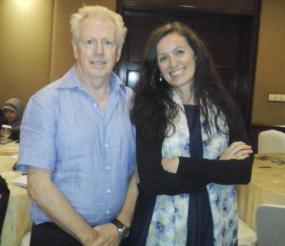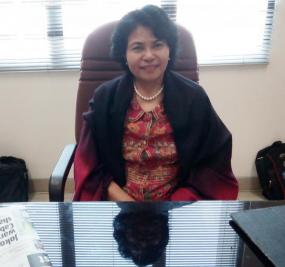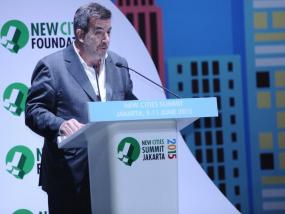"The heart of spirituality is love":Exclusive interview with Yudi Latif
Yudi Latif is the head of Pusat Studi Islam dan Kenegaraan Indonesia [the Center for Islamic and Nationalist Studies]. He appeared on the panel for the forum.
Strategic Review: You say there is an increase in intolerance in Indonesia today, even though Indonesia has a reputation for being a pluralist state in religious matters?
Yudi Latif: There tends to be not only religious intolerance, but also intolerance in ethnic relations, industrial actions and labor. The symptoms of intolerance do not stand alone.
SR: Do you think there has been an increase in the level of intolerance in recent years?
Yudi: I think, yes. Authoritarianism mainly comes from the state as a form of state terrorism. We initiated the reformasi era, but it seems that we have a problem. Democracy requires the absence of authoritarian rule, but it will not work well if its authority is too weak. With the change from the new order to the reformasi era, we lost authority, the authority of the State in the sense that it is not able to protect all the people of Indonesia, it is not able to enforce the rule of law, it does not guarantee legal certainty.
When the State fails to provide protection, the people will seek refuge in primordial ties. If the secondary group [he state] is not a legal guarantee, then people will seek refuge in the primordial: religious fundamentalism, tribalism or thuggery.
In terms of authority, the State really plays a role in religion, such as regulations on the construction of places of worship. Does this authority then inhibit religious freedom through a regulation that intervenes in it?
When the public sphere is open, the State must uphold the principles of republicanism and the principle of the Constitution that protects the freedom of every person to religious belief and expression. The State must uphold the rule of law, because the state often falters in the face of violent elements. Once the State falters, then violence will increase as various groups distrust the State's ability to enforce the rule of law. Democratization in Indonesia has not balanced by a deep belief in the need for the rule of law in a healthy democracy. What dominates is brute force. The government cannot act decisively because of the multi-party democracy and the concern that a crackdown will erode public support –this is actually a hallucination.
SR: Is catering to public support the only reason behind the government’s lack of a sharp response to intolerance?
Yudi: There are many factors. When analyzed in a more comprehensive manner, tolerance is foremost within religious theology itself. It must be recognized that the dissemination of religious values is a problem, the factors that are taught in these religions emphasize formalism and ritual. If these aspects are highlighted, group identity will be created, and eventually exclusivity. What is primarily first taught nowadays is formalism, not the morality of the religion itself, namely the golden rule.
All religions meet there, in the element of love, in God's name. The heart of spirituality is love, in the sense of how we perceive humans as the image of God. It is difficult now to find a religion that includes the dimensions of morality and ethics. Formalities. This phenomenon is also driven by aspects of globalization. Globalization challenges a lot of values. Local scholars who used to be gatekeepers and culture brokers, lose their strength. Information from the outside directly injects itself into the private space. From that, the international movement of religions emerged. Islam takes its primary influences from the Middle East, and scholars here have no power to adjust the new theology within a cultural context, the process of assimilation.
Now, through the intensification of globalization and communication, the periphery is considered artificial. The center is taken to be exemplary… and the intellectual capacity of local religious leaders cannot fill the void in public.
Also, when people have an identity crisis because of globalization, they go back to religion. And there are no writings supplied by Indonesian writers; they rely on translated versions of foreign writing. As far as the religion of Islam, it is not necessarily suited to Indonesian culture. It is also already sociologically well documented that the socially exclusive will be “closed.” People have ghetto ethics, exclusivity, they do not want to open up. Indonesia is a pluralist society but it has not developed multicultural attitudes. The mentality is still monocultural, as a result of the legacy of the New Order. Differences are not recognized; they are seen as taboo.
We should develop pluralism, but at the same time, there should be a national attitude of sameness linked through the Constitution and the language. Our civic education is bad, we should practice decision-making in a diverse community.
Lastly, intolerance is also linked to social inequality. No matter how strong our national bond, if there is widespread injustice, animal instincts will dominate. Because of that, violence often occurs in places where social welfare is low. Terrorism can be sourced to regions where economic life is worse. It is not a simple problem to overcome.
SR: With the growth of the middle class, shouldn’t intolerance get better?
Yudi: The middle class is supposed to be a buffer to neutralize class-based conflicts, but at this point, Indonesians are mostly within the lower-middle class. The middle class, in the real sense, is not big. If we see the Gini coefficient ratio of Indonesia, it is 0.41 percent, which means that 1 percent of 40 percent of Indonesia's population control the national economy. This is the highest level of inequality so far in Indonesia.
SR: But wouldn’t the Gini coefficient be higher as a state shifts from authoritarian to democratic?
Yudi: The transition to democracy is indeed dangerous. Political democratization is not necessarily followed by economic democratization. Again, the State's role becomes very important, to quickly compensate for the market’s failure to achieve the welfare state through providing employment sectors that could create a larger middle class.
The challenge is to develop Indonesia’s middle class. One are of shrinkage is in educational institutions. In higher education we only have two currents. One is high class, like Binus or UPH, where popularity is reflected in high tuition prices, and the other lower class and that involves diploma degrees and vocational training. Middle class universities are disappearing. This is an indication that we are at the wrong level of “middle class.”
Also, if the rising middle class is not well established in life, there will be much insecurity. Their source of certainty then is primordial identity, hence the middle class is a place for Indonesian fundamentalism to find recruits. Fundamentalism is a modern phenomenon, an urban product.
SR: Should there be a separation of mosque and state? For example, the Ministry of Religion is more inclined to one religion than the rest.
Yudi: State and religion in the experience of Islam cannot be separated, but it does not mean that the two are indistinguishable.
We call it the twin toleration, the religion and the state do not need to be separated because, but they can be distinguished.
Actually, the separation of religion and state presupposes an existing church structure that stands alone, with a chain of command that can be followed from top to bottom. This occurs in Christianity, in which religious leaders, the clergy, are within a coherent structure. But in Islam, especially in Indonesia, there is no such system of organization. That is why it is so hard for us to even determine the 1st of Shawal (Idul Fitri), because there is no one central structure.
In practice, however, such as in the case of Ahmadiyah, the MUI (the Indonesian Council of Ulema) does not recognize it as part of Islam, and the State legitimizes MUI’s decision. This results in Ahmadiyah being oppressed.
That is purely the ignorance of the State. MUI is not a legally binding institution. It is a new phenomenon that was created by the New Order. It is not always representative of well-respected scholars and the state often has no clear position because often MUI becomes the instrument of the State for such purposes, to legitimize some of its choices.
The state must protect all religions, but it cannot be an extension of religions.
SR: In Aceh now they do not allow veiled women to ride motorcycles together with men. What is your opinion on this?
Yudi: That’s the thing, the State may not prohibit the wearing of religious symbols in public because it's part of the citizens’ rights, but at the same time the State should not require religious identity to become public law. The problem in Indonesia is often the leaders of this country position themselves as a moral apparatus for their respective religions. Therefore they often feel bound by the moral code and religious identity themselves. In reality, once they become leaders, they have to protect all religions and public morality derived from Pancasila and the Constitution. This is the source of the problem.
There is also the problem of state leaders not fully understanding the principle of public life. In that case, who will fight for the public good?
SR: What do you do to promote tolerance?
Yudi: I approach it on two levels. First we need the process to promote a good understanding of public life within the State. How the public good, according to Pancasila and the Constitution, must be reflected in the conduct of the State. This is why I “rewrote” Pancasila in a book called “Negara Paripurna: Historitas, Rasionalitas, Aktualitas.” Today, leaders usually discuss this book for their education programs, because it gives a new insight for understanding Pancasila. The public life principle should be a common understanding for the political community. Secondly, there should be civic education on how to develop multiculturalism. Many religions talk about tolerance but each still practice their own ghetto ethics and there isn’t much religious diversity present in a shared workspace.
I feel that the question of tolerance is not limited to theoretical understandings. Along with my friends in PSIK and also in the Nurcholish Madjid Society, we made a religious jamboree in Puncak. We selected participants that reflect a blend of religious and ethnic diversity. On the first day, the participants gathered in their own groups, their own comfort zone. Afterwards, we split up into heterogeneous groups and made them participate in activities. We also brought them to different places of worship. Surprisingly, in the end, some of them even started dating, some even built communities to create inter-religious activities. This is a matter of creativity in developing civic education. There must be a multicultural approach and space.










 resized.png)
